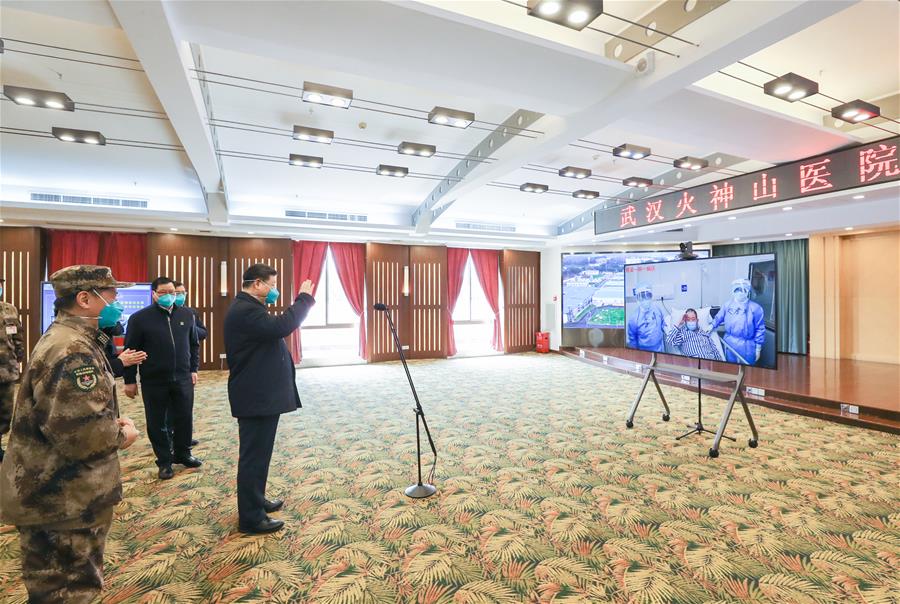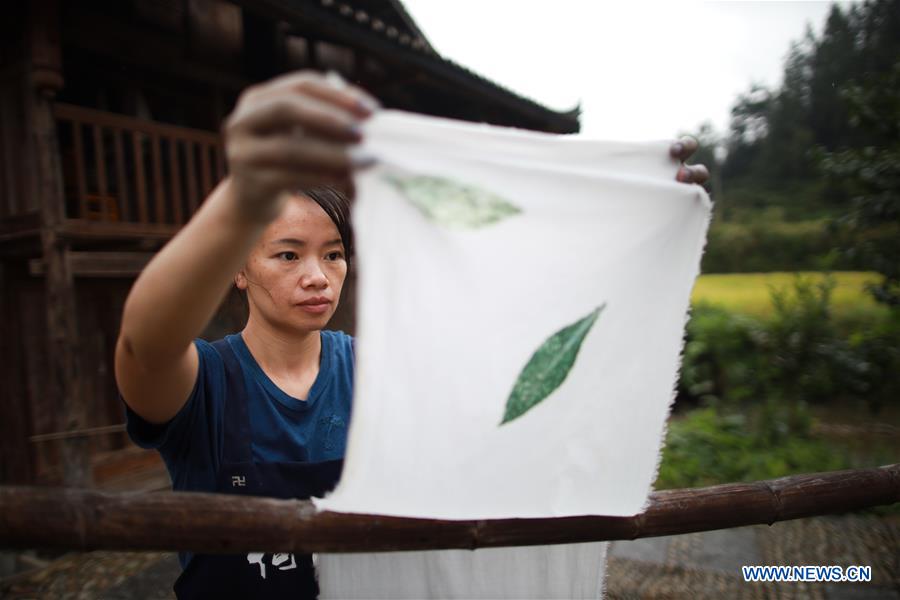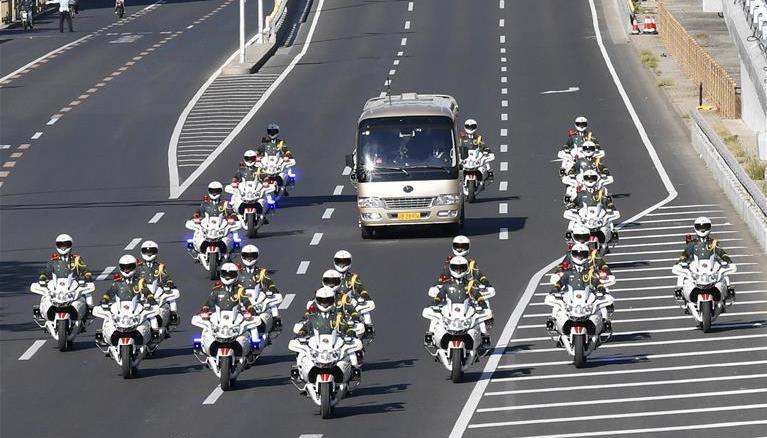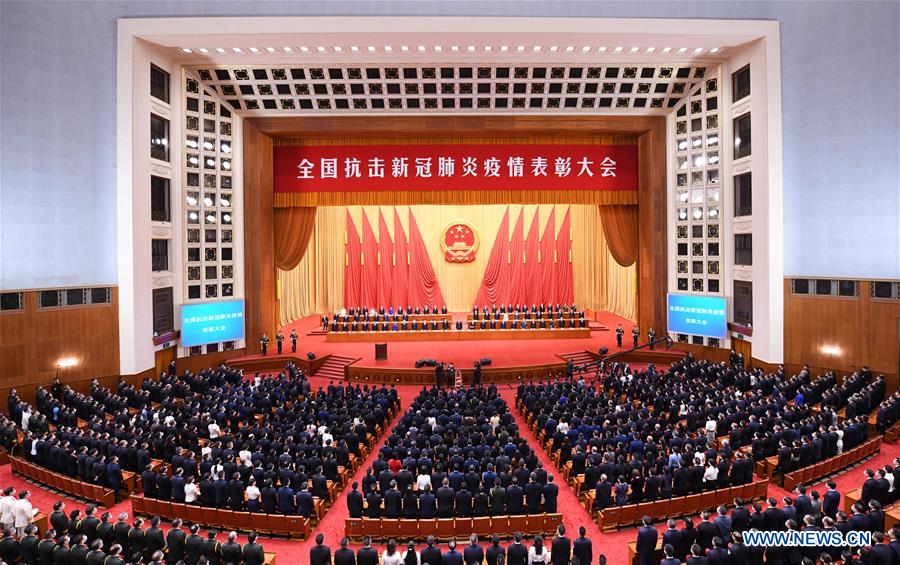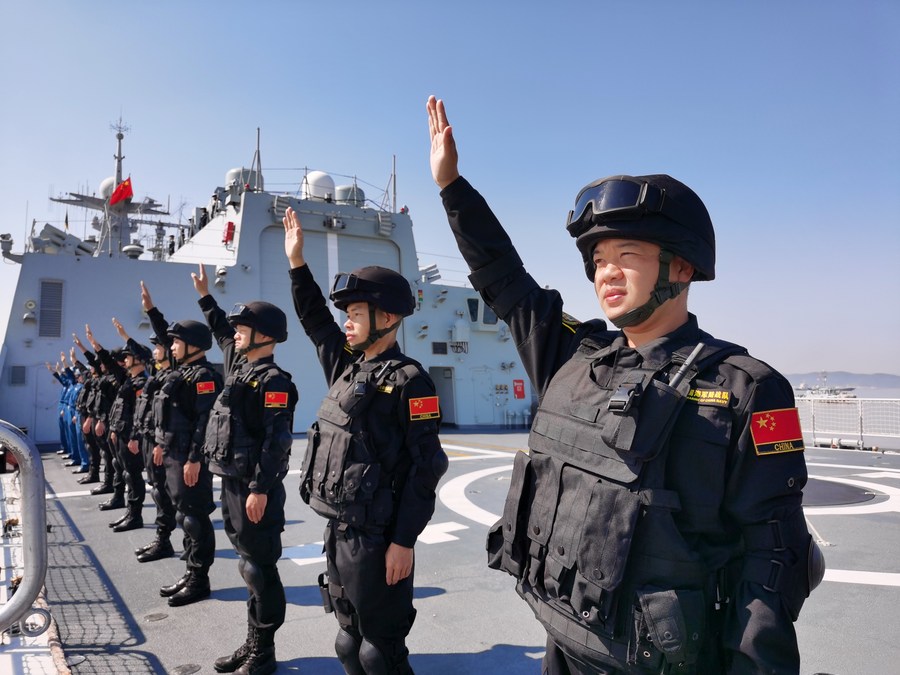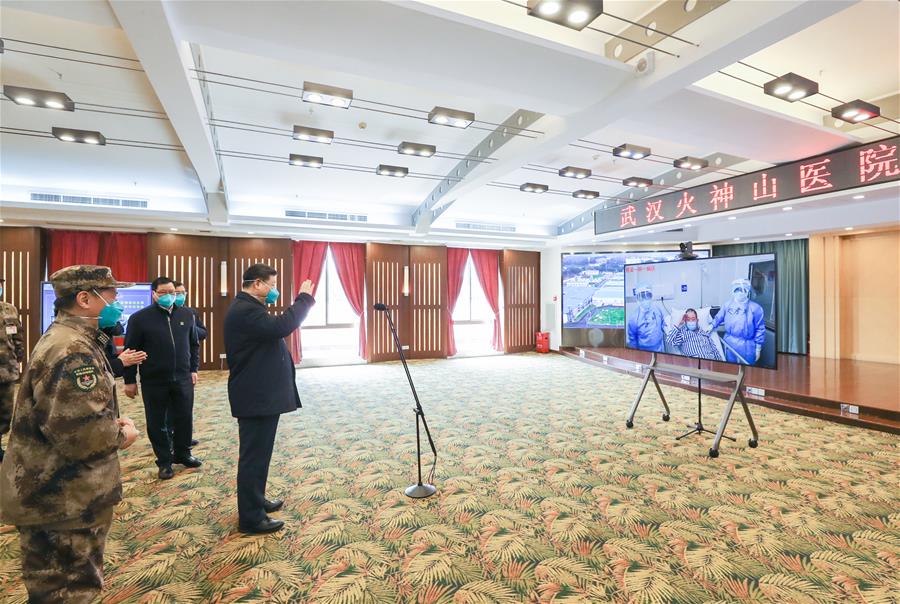
Xi Jinping speaks with a patient and medical workers by video link at Huoshenshan Hospital in Wuhan, central China's Hubei Province, March 10, 2020. Xi went to Wuhan on March 10 to inspect COVID-19 prevention and control work there. (Xinhua/Ju Peng)
BEIJING, Sept. 7 -- On March 10, 2020, at Huoshenshan Hospital in Wuhan, Chinese President Xi Jinping -- wearing a mask -- spoke to a patient lying in bed by video link.
"What you should do now is to stay confident. We all should be confident that we will win this war," Xi said. "Victory for Wuhan, victory for Hubei, and victory for China!"
Xi, also general secretary of the Communist Party of China (CPC) Central Committee and chairman of the Central Military Commission, appeared at a critical place -- Wuhan, the Chinese city hit hardest by the COVID-19 outbreak at the time.
Eight days after Xi's visit, the city reported no new cases for the first time. On April 26, Wuhan hospitals cleared all COVID-19 cases.
Over the past seven-plus months, China -- the world's most populous nation -- has gone through an extraordinary time. More than 80,000 Chinese were infected by the virus and about 4,700 people lost their lives. Epidemic control became the country's top priority.
During the Spring Festival holiday starting in late January, hundreds of millions of people abandoned their holiday plans. They stayed at home for weeks in a row. Cities were locked down, businesses were closed and public gatherings were canceled.
The annual sessions of the national legislature and the national political advisory body -- a key event on the country's political calendar known as the "two sessions" -- were postponed for the first time due to a public health emergency.
Xi said the epidemic was the fastest spreading, most extensive and most challenging public health emergency the country had encountered since the founding of the People's Republic of China in 1949.
"Life is of paramount importance," Xi said. He launched a "people's war" and personally took charge of the response, marshaling national resources to fight the "invisible enemy."
In little more than a month, the rising spread of the virus was contained; in around two months, the daily increase in domestic coronavirus cases fell to single digits; and in approximately three months, a decisive victory was secured in the battle to defend Hubei Province and its capital city of Wuhan -- a major achievement of strategic importance in the nationwide fight against COVID-19.
Though there were a handful of sporadic outbreaks over the past few months, the Chinese government -- with its experience and targeted measures -- managed to break the transmission routes quickly.
From a global perspective, China was among the first countries to resume work and reopen schools and businesses. The country is now racing against the clock to win its anti-poverty fight and achieve a moderately prosperous society in all respects.
LEADERSHIP IN TIMES OF CRISIS
The COVID-19 epidemic changed Xi's schedule. People familiar with his work said Xi dedicated himself to leading epidemic control efforts and gave instructions every day at the height of the outbreak.
Xi devised a set of general principles to guide the fight against the virus, emphasizing "remaining confident, coming together in solidarity, adopting a science-based approach and taking targeted measures."
On Jan. 7, when Xi chaired a meeting of the Standing Committee of the Political Bureau of the CPC Central Committee, he underlined the importance of properly handling the epidemic -- known then as "an epidemic of pneumonia of unknown cause."
On Jan. 20, Xi gave important instructions on fighting the epidemic, emphasizing that people's lives and health must come first and resolute efforts should be made to stem the spread of the virus. He also called for the prompt release of information on the epidemic and enhanced international cooperation.
On Jan. 22, Xi ordered the immediate imposition of tight restrictions on the movement of people and channels of exit in Hubei and Wuhan. Xi said making the decision required enormous political courage. "But time calls for resolute action. Otherwise, there would be trouble," he said.
On Jan. 23, Wuhan suspended all urban public transportation and cut off outbound flights and trains. Putting a megacity with over 10 million residents under lockdown was unprecedented, but crucial.
Since the 18th CPC National Congress in 2012, Xi has repeatedly stressed that cadres must have a strong sense of responsibility. "Stay loyal to the Party, strive for people's well-being, work hard..." These are the consistent tenets upheld in various Party endeavors.
Xi did not sleep well on Chinese New Year's Eve as he shouldered the heavy responsibility to fight the epidemic.
The next day, Jan. 25, Xi convened a meeting of the Standing Committee of the Political Bureau of the CPC Central Committee on epidemic control. He told his six colleagues on the standing committee that the situation was pressing and they needed to study the issue together.
Xi took the lead in making a donation to support epidemic control efforts. He said the principle of early detection, reporting, quarantine and treatment must be strictly observed. And he called for saving lives by raising admission and cure rates and lowering infection and fatality rates.
Xi made specific response demands at different stages of the battle. Since the start of the outbreak, he has chaired a great number of high-level meetings to devise containment measures. These included 17 meetings of the Standing Committee of the Political Bureau of the CPC Central Committee, four meetings of the Political Bureau of the CPC Central Committee, and leadership meetings on law-based governance, cyberspace affairs, foreign affairs and the deepening of reform amid the epidemic.
He also instructed the military to join the fight and chaired a series of symposiums, including one with non-CPC members to hear their suggestions and another with experts on building a strong public health system.

